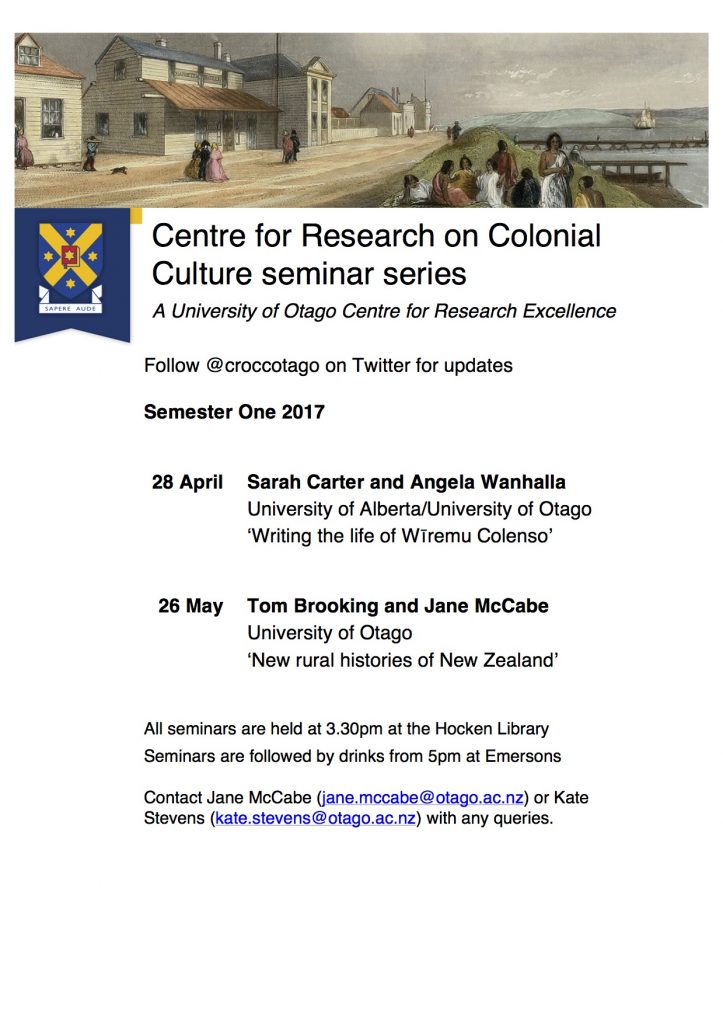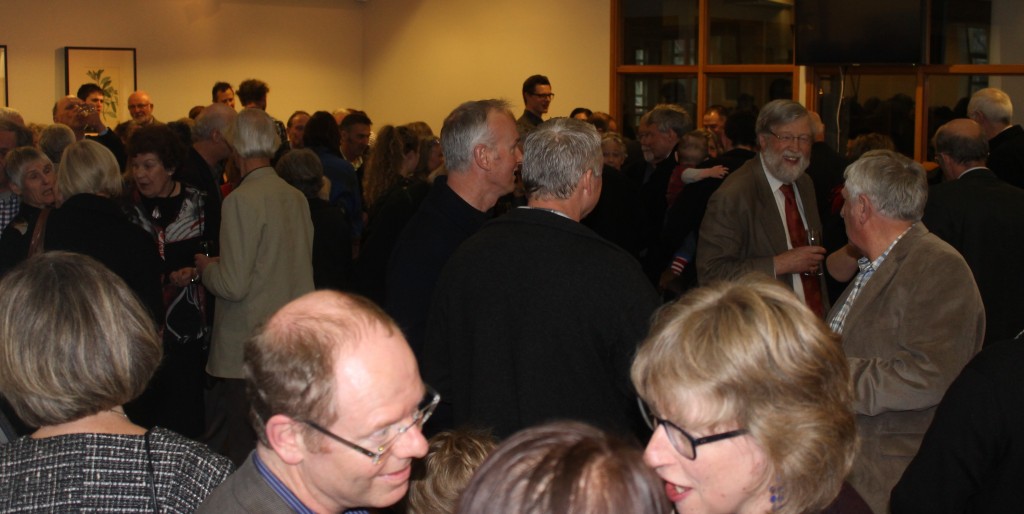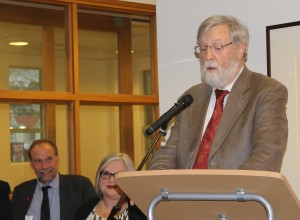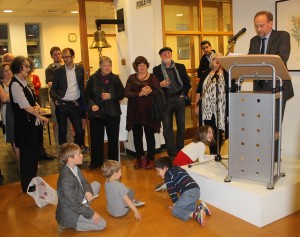New Rural Histories of New Zealand
Prof. Tom Brooking and Dr. Jane McCabe will present at the next CRoCC research seminar on Friday 26 May on aspects of New Zealand’s rural history.
In early June, Tom and Jane will present at the annual meeting of the Agricultural History Society on the theme “Who is a farmer? Regional identity and rural culture”.
They will present their papers at Friday’s seminar in preparation for the Agricultural History Society Conference. They are very keen to get feedback on their presentations.
Their talks will take place in the Hocken Seminar Room on Friday May 26th starting at 3.30. Coffee, tea and snacks will be provided, and all are invited to come for social drinks at Emerson’s afterwards.
All are welcome!
Three Centre members finalists for best History book award
Professor Tony Ballantyne, Professor Tom Brooking, and Dr Angela Wanhalla, are three of the the four finalists for the inaugural W.H. Oliver Prize for best book on New Zealand history, to be awarded next week at the New Zealand Historical Association conference. The books are Tony Ballantyne, Entanglements of Empire: Missionaries, Maori, and the Question of the Body (AUP); Tom Brooking, Richard Seddon, King of God’s Own: The Life and Times of New Zealand’s Longest Serving Prime Minister (Penguin); and Angela Wanhalla, Matters of the Heart: A History of Interracial Marriage in New Zealand (AUP).
All three finalists are academics within the Department of History and Art History, but also members of the Centre for Research on Colonial Culture. For the full story, read the latest article in the Otago Bulletin Board.
Centre member wins Ernest Scott Prize 2015
Congratulations to Professor Tom Brooking whose Richard Seddon, King of God’s Own: The Life and Times of New Zealand’s Longest-Serving Prime Minister was co-winner of the Ernest Scott Prize for 2015, with Alan Atkinson’s The Europeans in Australia, Vol 3: Nation. Tom is the second CROCC member to have won this prize awarded for “the most distinguished contribution to the history of Australia or New Zealand or to the history of colonisation”. Angela Wanhalla won in 2014, and Centre director, Tony Ballantyne, was shortlisted in 2013. Click here for the publisher’s info on Richard Seddon.
Seddon biography shortlisted for prize
Congratulations to CRoCC member, Professor Tom Brooking, from all in the Centre for being shortlisted for the prestigious Ernest Scott Prize, awarded by the Australian Historical Association for best book in Australian and New Zealand history. You can read about Tom’s competition here. Three New Zealand history books are shortlisted, including Tangata Whenua by Atholl Anderson, Judith Binney and Aroha Harris, which includes a contribution by another CRoCC member, Dr. Michael Stevens. The winner will be announced at the Australian Historical Association conference dinner in July. Congratulations to all who have been shortlisted!
Colonial Worlds Elemental Histories Symposium
A one-day elemental histories symposium, a Centre for Research on Colonial Culture event, was held on 31st October, at the Hocken Collections. ‘Colonial Worlds Elemental Histories’ began with a keynote address from Grace Karskens, Associate Professor, UNSW. Her stories of early settlers (1802-1830s) who farmed the fertile but flood-prone Castlereagh region west of Sydney, revealed dogged determination in the face of repeated devastation. The settlers developed a culture of risk-taking and opportunity that underlay their fatalistic attitude towards the Australian bush.
Professor Tom Brooking’s paper ‘Yeotopia Gained: New Zealand 1840-1914’ explained how by 1914 most farming in New Zealand was carried out by family concerns but on someone else’s land. The changes in land ownership revealed a fracturing of a flawed dream.
‘Elementally United: The Case of Canterbury’s Nor’west Wind’ by Katie Pickles exhorted us to think with our senses. The wind, a dominant force in shaping emotion is both felt and seen in the landscape.
Dr Michael Davis’s paper entitled ‘Entangled Knowledges: Indigenous and Environmental Histories across the Tasman’, featured the botanical explorations and friendships between New Zealander William Colenso, Australian Allan Cunningham and Englishman Joseph Dalton Hooker.
In ‘Getting to Know You: People and Rabbits in Southern New Zealand’, Emeritus Professor Peter Holland presented a collation of information culled from diaries and ledgerbooks of rural farms and stations. Across southern New Zealand rabbit densities varied with swings in weather and climate, and interactions between people and rabbits changed.
By contrast Dr Vaughan Wood examined a single but detailed diary for his paper ‘Mapping the network of a nineteenth century Canterbury farm.’ He was able to plot, trips to the store, post office, friends and relations. Asymmetric patterns of movement across farms were governed by swampy land. These farming men, he concluded were an integral part of community.
After lunch Dr Michael Roche gave us an exposition on ‘The Forest as an Elemental Natural Resource in Colonial New Zealand and the First Failure of Scientific State Forestry, 1874 to 1877.’ These three years saw the introduction of scientific forestry brought by Captain Campbell Walker, who had a career with the Indian Forest Service in Madras and had studied orthodox German practice.
Continuing with the forestry theme Dr André Brett provided us with ‘Forests and Provincial Abolition: Did Conservation Kill the Provinces?’ Forest conservation enjoyed prominent supporters in the political and scientific communities during the provincial era, but it failed to capture the public imagination.
Dr James Beattie’s paper ‘Expanding the Horizons of Chinese Environmental History: Cantonese gold-miners in colonial New Zealand, 1860s-1920s’, used the experiences Chinese working alluvial gold in Otago to explain how their traditional knowledge of water management techniques coupled with hard work and tenacity changed the landscape. One entrepreneurial family Choie Sew Hoy was particularly important in the dredging boom of the 1890s.
PhD Candidate Lucy Mackintosh shared her research on Auckland’s several park-scapes. Her paper ‘Shifting Grounds: Narratives of Identity in Auckland Landscapes’ examined the urban environment with its monuments. ‘Our parks’ she claims ‘so often valued for their natural features, are also rich repositories of stories about the past.’
Continuing the theme of public spaces, Dr Joanna Cobley’s paper ‘The Nineteenth Century Landscape: economics, heritage and national identity’ looked at the heritage site of Tongariro National Park. Gifted to the nation in 1887 this first National Park is still viewed within the frameworks of useful and beautiful.
In the final paper of the day Eric Pawson ‘Writing environmental history’ asked the delegates for their input on an article he was finishing for the International Encyclopedia of Geography.
At a small function also held at the Hocken the book James Beattie and Matthew Henry launched their book Climate, Science, and Colonization: Histories from Australia and New Zealand, by James Beattie, Matthew Henry and Emily O’Gorman (eds). Palgrave MacMillan, London, 2014. Emily O’Gorman was unable to attend the function.
Thanks to Rosi Crane for supplying this report.
Launch of “Richard Seddon: King of God’s Own”
Well over 100 people packed into the Hocken Collections foyer last night to help launch CROCC member Professor Tom Brooking’s latest book, Richard Seddon: King of God’s Own, giving a great indication of both Tom’s wide circles of friends and his reputation of one of New Zealand’s leading historians. As anyone who knows Tom would expect, there was a range of interesting wines and beers to help the celebration.Hocken Librarian, Sharon Dell, introduced the event, and was followed by Emeritus Professor Erik Olssen who formally launched the book. As Erik pointed out, there had not been a comprehensive biography since R.M. Burdon’s 1955 biography on New Zealand’s most successful Premier perhaps due to the the giant shadow that Seddon cast. Tom’s biography opens up considerable new perspectives and information on the man.
Tom Brooking then discussed the topic of his research, recounting Seddon’s many achievements and his ability to connect with Māori, with workers, and the general public. However he was also a man of his own times, and his imperialist jingoism and anti-Chinese sentiment would not meet with such popular acclaim today.
At 584 pages this is a substantial book, but also one destined to be a classic within New Zealand historiography.
New Biography on Richard Seddon
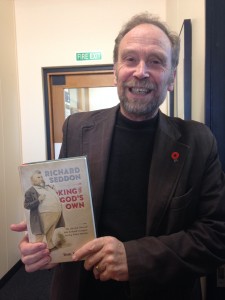 Richard Seddon was a colossal figure in New Zealand politics up to his death in 1906. His Liberal Party was New Zealand’s first modern political party; his government introduced old age pensions and votes for women, as well as an industrial conciliation and arbitration system. Seddon was able, for much of his time as Prime Minister, to gain the support from a wide range of the political spectrum, at the same time that the rest of the world marvelled at the country’s “socialist” experiments.
Richard Seddon was a colossal figure in New Zealand politics up to his death in 1906. His Liberal Party was New Zealand’s first modern political party; his government introduced old age pensions and votes for women, as well as an industrial conciliation and arbitration system. Seddon was able, for much of his time as Prime Minister, to gain the support from a wide range of the political spectrum, at the same time that the rest of the world marvelled at the country’s “socialist” experiments.
It has been almost 60 years since an authoritative biography of Seddon has appeared, R.M. Burdon’s King Dick. Until now! CROCC member, Professor Tom Brooking’s latest book Richard Seddon: King of God’s Own has just been published by Penguin Books, and gives us fresh insights into “the Life and Times of New Zealand’s Longest-serving Prime Minister”. Congratulations, Tom.

